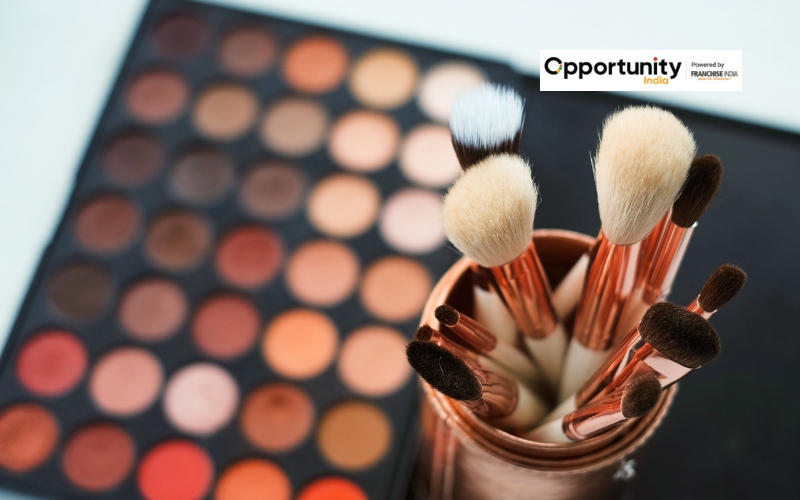
Have you ever considered starting your own line of cosmetics? The sort with gorgeous packaging, fantastic skincare or cosmetics, and an expanding community of people who speak for your products? Guess what, though? You're far closer than you believe to realizing what you want. The beauty sector is experiencing unprecedented growth, making 2025 the ideal year to launch your own cosmetics business. Whether you're interested in vegan makeup, organic skincare, or something completely different, this guide will show you the precise steps—and the necessary budget—to achieve your goals.
Why Start a Cosmetic Business?
The size of the Indian cosmetics market was estimated at 14.6 billion in 2024 and is projected to grow at a compound annual growth rate (CAGR) of 5.9% from 2025 to 2033, reaching 24.3 billion. The cosmetic sector is a ray of hope in a world where people are becoming more conscious of their own expression and self-care. From skincare advancements to hair care, makeup artistry, and fragrances, the desire for high-quality, ethically produced beauty products is only growing.
Also Read: 12 Sustainable Business Ideas in 2025
Starting a cosmetics business offers entrepreneurs a wide range of exciting opportunities, particularly in a market as dynamic as India. It's an appealing venture for the following main reasons:
Demand in the Market Is Rising
India's cosmetics industry is among the fastest-growing in the world. The demand for skincare, haircare, and makeup products has increased dramatically as both men and women have become more mindful of their appearance. People in tier-II and tier-III towns, as well as urban areas, are becoming increasingly motivated to spend money on cosmetics that improve their appearance and well-being. Due to this, it's a profitable sector with high customer demand and recurring business.
Transition to Natural and Organic Goods
Today's consumers are more aware of ingredients than ever before. Organic, ayurvedic, and cruelty-free cosmetics are replacing harsh chemicals. For businesses looking to launch sustainable, eco-friendly beauty brands, this change presents an enormous opportunity. The beauty sector provides the ideal setting for integrating your ideals with your business if you have a strong interest in holistic wellbeing or natural living.
Low Barrier to Entry and Flexible Models
A large plant or millions of dollars in investment are not necessary to get started. With a small investment, you may start your business from home through white-label production and online sales platforms. Many well-known independent firms started out selling only a small number of goods straight on their website or Instagram. The business plan enables you to begin small, pick things up quickly, and grow gradually.
Creativity Meets Entrepreneurship
Not only is starting a cosmetics business profitable, but it's also enjoyable and rewarding. You may create stunning packaging, try out different ingredients, create a distinctive brand narrative, and use your imagination. If color, skincare, or product aesthetics have ever excited you, this is a business where passion immediately leads to profit. Additionally, you're creating something that gives individuals a sense of empowerment and confidence.
Also Read: Start a Makhana Snacks Business from Home
Scalable and Evergreen Industry
Beauty is a part of daily life and not a fashion statement. The demand for cosmetics is steady throughout the year, in contrast to other seasonal businesses. Scaling through new product lines, retail partnerships, or exports is simpler once you've determined your market fit. With space for tech-enabled skincare, customized cosmetics, and subscription boxes, the business is also prepared for the future.

Step-by-Step Cosmetic Business Plan
It takes careful planning, smart execution, and a thorough understanding of the industry to transform a little idea into a successful cosmetic brand.
Choose a Niche
What do you want to sell in your cosmetic business? Select the type of cosmetics you wish to sell before you debut. Depending on your preferences and current market trends, concentrate on an attractive specialty.
Common Cosmetic Niches:
- Organic Skincare (moisturizing products, face serums)
- Herbal hair care products (oils, shampoos)
- Vegan and cruelty-free cosmetics (foundation, lipsticks)
- Cosmetics Using Ayurveda
- Men's Personal Care Items
- Cosmetics for Baby Care
Pro Tip: Before growing, test the market with 3 to 5 hero products.
The Executive Summary: Your Business in a Nutshell
The executive summary serves as the elevator pitch for the business plan. It should capture the spirit of your endeavor and be concise and captivating.
- Business Name: Pick an innovative name that accurately represents your business, and is accessible for domain purchasing and registration.
- Mission Statement: Clearly state your goal. What principles guide your company? What effect do you hope to achieve?
- Statement of Vision: Think about the future. In 5 to 10 years, where do you envision your business?
- Goods and Services: Describe your initial product offers in brief (e.g., artisanal soaps, cruelty-free makeup, organic skincare line).
- Target Market: Who is the target market for your product? (For instance, millennials who care about the environment, fans of high-end skincare products, and makeup artists).
- USP, or Unique Selling Proposition: What distinguishes and elevates your brand above the competition?
- Financial Highlights: Summarize your expected profitability and any financial requests you may have.
Also Read: Pokkali Rice Farming Business in India
Create the Products
To launch a genuine business, you will require:
(a) White Labeling: Collaborate with an approved producer to market cosmetics under your own name. It's quick, affordable, and perfect for beginners.
(b) Custom Formulation: Develop a special formula in collaboration with experts. Although it takes more time and money, this allows you more control.
Make sure your goods are:
- Dermatologically tested
- Free of dangerous substances
- Under Indian regulatory norms (BIS/CDSCO)
Lawful Registration and Adherence
To launch a genuine business, you will require:
- Company Registration (LLP, PVT LTD, or sole proprietorship)
- GST Registration
- Trademark for a business name
- FSSAI License (for edible products, such as lip balms)
- A CDSCO license to manufacture and market cosmetics in India
This step prevents legal issues and enhances credibility, so don't skip it.
Find a Manufacturer or Set Up a Lab
If you decide to use white labeling, get in touch with reliable producers. Set up a small lab if you wish to manufacture internally; this will require licensing, specialized labor, and equipment expenditure.
Key Considerations:
- MOQs (Minimum Order Quantities).
- Lead time for manufacturing
- Shelf-life and product testing
Labeling and Packaging
When it comes to selling beauty items, packaging is quite important. It needs to be eye-catching, educational, and long-lasting.
Also Read: Goat Farming Business Plan: Key Steps
Label Requires:
- Name and description of the product
- Ingredients
- Date of expiration and batch number
- Details about the manufacturer
- The net amount
- Instructions for use
Millennials and Gen Z are drawn to minimalist designs and eco-friendly packaging. Product quality, branding, and rival pricing should all be reflected in your pricing. Depending on your distribution channel (distributor, online, or retail), aim for a profit margin of 30–60%.

Choose a Pricing Plan
Product quality, branding, and rival pricing should all be reflected in your pricing. Depending on your distribution channel (distributor, online, or retail), aim for a profit margin of 30–60%.
Don’t forget to factor in:
- Cost of products (packing + production)
- Distribution and marketing
- Taxes and shipping
- Open an Online Store
- Begin by selling on websites like as:
- Your Own Website (WooCommerce, Shopify)
Marketplaces: Meesho, Nykaa, Flipkart, and Amazon
Social commerce: Facebook Shop, Instagram
Bonus: You have more control over data, branding, and client loyalty when you have a website.
Marketing Strategy to Get Sales
A gorgeous product won't sell if it isn't visible. Your marketing strategy needs to include:
Digital Marketing Plan:
- YouTube & Instagram Influencer Marketing
- YouTube tutorials and SEO blogs
- Google Ads and Facebook
- Email marketing for repeat orders
- Referral programs and customer reviews
Consumers purchase cosmetics from brands they trust; cultivate that trust with reviews and content.
Also Read: How to Start a Tea Business in India?
Investment Breakdown: Cosmetic Business
Here's an approximate investment guide to starting a small-scale cosmetic business in India:
| Expense Head | Cost (INR) |
|---|---|
| Brand Registration & Legal | ₹20,000 – ₹40,000 |
| Product Development/White Label | ₹1,00,000 – ₹2,00,000 |
| Packaging Design & Printing | ₹50,000 – ₹1,00,000 |
| Initial Inventory (MOQ) | ₹1,00,000 – ₹2,00,000 |
| Website Development | ₹25,000 – ₹50,000 |
| Digital Marketing (3 months) | ₹50,000 – ₹1,00,000 |
| Licenses (CDSCO, GST, etc.) | ₹20,000 – ₹40,000 |
| Miscellaneous (shoots, testers) | ₹20,000 – ₹30,000 |
| Total Estimated Cost | ₹3 – ₹6 Lakhs |
The cosmetics industry is a vibrant, fascinating, and opportunity-rich sector. With the correct plan and execution, you may turn your goal into a successful business, regardless of your passion for skincare, beauty, or holistic wellness. You're already one step ahead of the majority of would-be cosmetic entrepreneurs with this comprehensive guidance and investment strategy. Why wait, then? Create your brand now. You only need a plan to build your cosmetic business!

